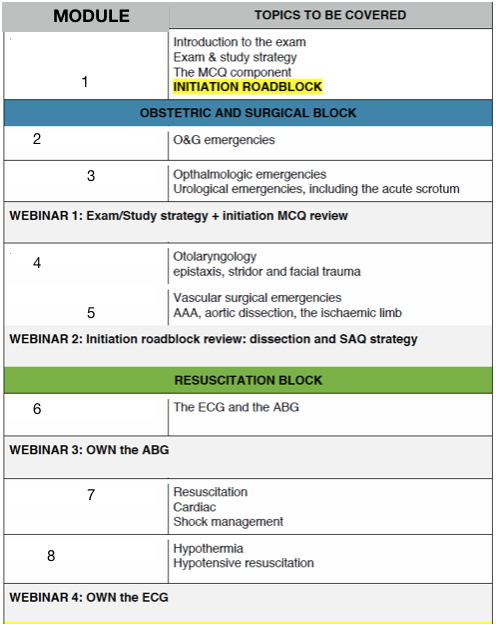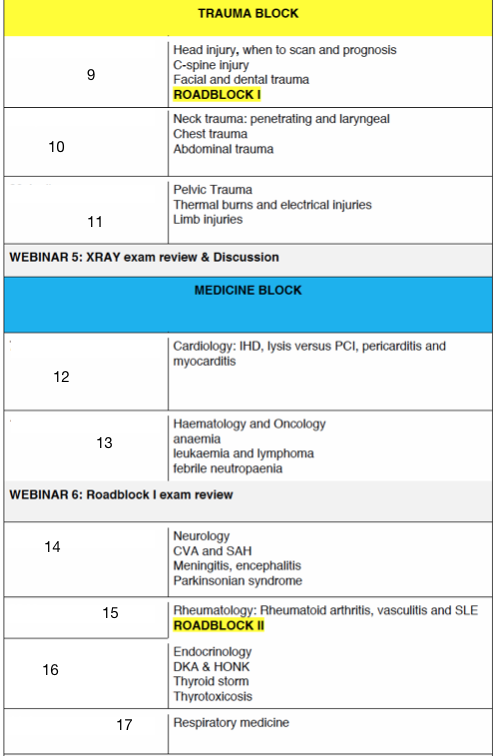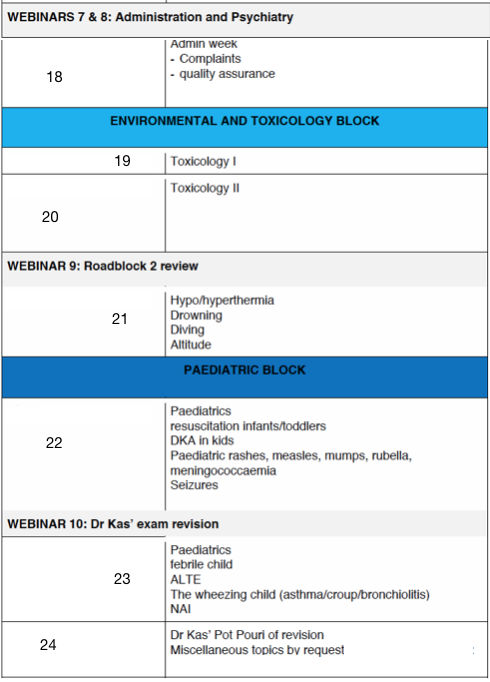introduction to the exam and the mcq.
Where do you start when preparing for the Fellowship Exam? Well here's the secret.....you don't start at the beginning!
You start with strategy! Its important to understand the question types and how they are set, from the examiners point of view and then structure learning based on strategy and high yield topics. Study SMART!
You start with strategy! Its important to understand the question types and how they are set, from the examiners point of view and then structure learning based on strategy and high yield topics. Study SMART!
This is an easy module to get you started. We will be focussing on the MCQ. MCQs are a major component of the written exam, and you should all pass them. There is a strategy about where they come from and a strategy of how to approach them.
There is a video below to watch, a clinical problem to get you thinking, some general articles on exam strategy and study efficiency and a list of topics being covered in the syllabus.
The harder you work, the more you get out of it.
You will be asked to write questions on a regular basis. Doing this is CRITICAL to you passing. I repeat, WRITE QUESTIONS. More on this during the webinars.
Finally, there is an MCQ (half size) test for you to take.
There is a video below to watch, a clinical problem to get you thinking, some general articles on exam strategy and study efficiency and a list of topics being covered in the syllabus.
The harder you work, the more you get out of it.
You will be asked to write questions on a regular basis. Doing this is CRITICAL to you passing. I repeat, WRITE QUESTIONS. More on this during the webinars.
Finally, there is an MCQ (half size) test for you to take.
SYLLABUS
There are 24 modules to complete, PLUS Roadblock Exams, PLUS Webinars
watch.
|
Check out the introduction to the fellowship course, as well as a video on how to approach the MCQ exam. Part of your preparation should (obviously!) be doing a large number of MCQs, but thinking about HOW and WHY multichoice questions are constructed is a vital part of success in this major part of the exam. This is a major insight, and it will change the way you study.
|
|
READ.
Below are three documents for you to read.
Firstly some words from our founder and course director Dr Peter Kas on two common questions he has been asked over his years of fellowship teaching:
The second document is some commentary on the new exam entitled "Some initial thoughts on the fellowship exam". We think this is important, because why and how you answer questions is easily as important as what you actually write. Exam strategy is a major part of the fellowship course, so grab a cup of tea and take ten minutes to read through. We think you'll find it useful.
Below this is the syllabus for the course. Please keep it with you. We will cover the topics specified each week and then prepare questions for the week after.
IPAD USERS: pdf forms of the documents are provided below the scribd viewer.
Firstly some words from our founder and course director Dr Peter Kas on two common questions he has been asked over his years of fellowship teaching:
- How do I learn?
- How do I take notes?
The second document is some commentary on the new exam entitled "Some initial thoughts on the fellowship exam". We think this is important, because why and how you answer questions is easily as important as what you actually write. Exam strategy is a major part of the fellowship course, so grab a cup of tea and take ten minutes to read through. We think you'll find it useful.
Below this is the syllabus for the course. Please keep it with you. We will cover the topics specified each week and then prepare questions for the week after.
IPAD USERS: pdf forms of the documents are provided below the scribd viewer.
DOCUMENTS
1. How do you learn?
1. How do you learn?
| learning_paradigms.pdf | |
| File Size: | 76 kb |
| File Type: | |
2. Some Initial Thoughts on the Fellowship Exam
| some_thoughts_on_preparing_for_the_fellowship_exam.pdf | |
| File Size: | 113 kb |
| File Type: | |
3. The fellowshipexam.com syllabus
| curriculum_2018.1.pdf | |
| File Size: | 61 kb |
| File Type: | |
solve.
Although the exam format has changed, the solution of ABG/VBG and other lab problems as well as the interpretation of ECGs, will still be there in one way or another.
Please try this problem. It is a Venous gas sample on a patient.
A 68 yo woman with known COPD, on home oxygen, presents a little drowsy. Her initial Co2 on venous gases was 84mmHg. She is placed on a short course of CPAP and is soon sitting out of bed eating sandwiches. The medical registrar looks at the venous gases and doesn’t want to take the patient to the ward because of the CO2. What do you think? Can she go to the ward? Support your argument with calculations.
pH 7.25
pCO2 74
pO2 17
HCO3- 33
Please try this problem. It is a Venous gas sample on a patient.
A 68 yo woman with known COPD, on home oxygen, presents a little drowsy. Her initial Co2 on venous gases was 84mmHg. She is placed on a short course of CPAP and is soon sitting out of bed eating sandwiches. The medical registrar looks at the venous gases and doesn’t want to take the patient to the ward because of the CO2. What do you think? Can she go to the ward? Support your argument with calculations.
pH 7.25
pCO2 74
pO2 17
HCO3- 33
write- homework
- Please write 2 high quality MCQ’s in O&G. These must be typed and have 4 distractors (i.e. A,B,C and D). Also for each MCQ write a couple of lines, that explains the answer that is correct and may also explain why the other answers are not. Give references to your textbook sources.
- Write one short multipart SAQ on the topic of O&G.



